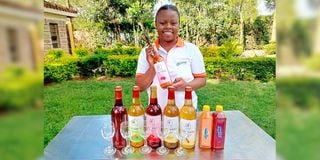Sip the tropics: Kenya's fruitful revolution in winemaking

Angela Oyugi, founder of Cecanni, a trailblazing brand harnessing alternative fruits to create delightful beverages.
What you need to know:
- Ms Oyugi, a food scientist with a passion for transforming fruit into exquisite wines and juices, leads this flavourful charge.
- To maintain quality and sustainability, Cecanni works closely with farmers who use sustainable farming practices.
Grapes may reign supreme in the world of wine, but Kenya is making waves with its treasure trove of alternative fruits such as mangoes, bananas and pineapples.
Enter Cecanni, a trailblazing brand that is harnessing this bounty to create delicious drinks and tackle the post-harvest losses faced by local farmers.
From the sun-drenched fields of Kenya, the vibrant colours and intoxicating scents of tropical fruits have long inspired a deep appreciation for nature's bounty.
For Angela Oyugi, founder of Cecanni, her earliest memories are intertwined with the juicy sweetness of mangoes, the creaminess of bananas and the refreshing tang of pineapples.

Angela Oyugi displays a brand of beverage that her company manufactures.
Growing up surrounded by these rich flavours, she often witnessed the heartbreaking sight of perfectly good fruit going to waste. This ignited a passion in her – a desire to find innovative ways to preserve these treasures and turn them into something valuable.
Cecanni was born out of the need for innovative solutions to reduce waste, sparking a journey of experimentation with Kenya's diverse seasonal fruits. The result? A vibrant range of fruit wines that capture the essence of Kenyan culture and community.
Ms Oyugi, a food scientist with a passion for transforming fruit into exquisite wines and juices, leads this flavourful charge. With offerings ranging from a six-year-old wine to a fresh six-month-old blend, her creations promise a taste of the tropics.
“My academic background in Food Science and Technology provided a solid foundation for my venture into winemaking. With expertise in food processing, quality assurance, and quality control, I gained essential insights into fermentation and the chemistry involved in transforming fruits into exceptional wines,” she says.
This training not only equipped her with the necessary technical skills, but also ignited her passion to create a product that embodies the richness of Kenyan agriculture.
Cecanni was founded with a clear vision: to create a sustainable business that reduces post-harvest losses and adds value to local produce. Her personal experiences and core values — rooted in sustainability, community support and innovation — drive this mission. By focusing on local fruits, Cecanni is committed to uplifting the communities that grow these valuable resources.
“In the Kenyan beverage industry, I identified a significant gap: a lack of effective technologies to manage post-harvest losses, coupled with a shortage of innovative, locally sourced fruit wines. Recognising this void, Cecanni stepped in to provide a unique product that not only tantalises the taste buds but also supports local farmers by creating a reliable market for their ripe fruits,” she says.
Cecanni's approach not only meets consumer demand for unique flavours, but also addresses the challenges faced by local farmers. By processing ripe fruit that might otherwise be discarded, the brand creates high-quality wines that provide an additional source of income for farmers, helping to alleviate issues of income instability and waste.
The journey from fruit to wine is a labour of love. It starts with sourcing ripe fruit directly from farmers or aggregators. Each fruit is carefully selected, cleaned and prepared for fermentation. The fermentation process transforms these tropical delights into a beverage that encapsulates the essence of Kenya.
After fermentation, the wines are aged to develop their flavours before being bottled and distributed. Ms Oyugi insists on rigorous quality control at every stage to ensure that only the finest products reach consumers.
To maintain quality and sustainability, Cecanni works closely with farmers who use sustainable farming practices.
“Regular farm visits and strict quality checks guarantee that the best fruits are chosen for winemaking. My commitment to supporting farmers extends beyond sourcing; I provide training and resources to help them improve their practices, ensuring a mutually beneficial relationship,” she says.
Cecanni currently produces around 45 to 50 bottles of wine per cycle, depending on the type of fruit and seasonal availability. The brand has a growing portfolio of products, including flagship offerings such as Mango Wine, Pineapple Wine, Strawberry Wine, Gooseberry Wine, Dragon Fruit Wine, Hibiscus Wine and Banana Wine. Each bottle tells a story, not only of the fruit, but of the community and culture from which it was sourced.
The price range for Cecanni's wines, set between Sh1,200 and Sh1,500, reflects the cost of raw materials and production while ensuring quality. This pricing strategy also aims to provide fair compensation to the farmers who contribute to the process.
Cecanni's initiatives have had a significant impact on local communities, reducing waste and improving food security by ensuring that more produce is used.
Despite her successes, Cecanni faces challenges in sourcing tropical fruit, including seasonal supply fluctuations, logistical hurdles and quality consistency. However, she acknowledges that her commitment to working directly with farmers fosters strong relationships that help mitigate these issues.

Some of the brands of wines manufactured by Angela Oyugi's company.
“We actively engage with local farmers, who play a vital role in the brand's success. Through direct partnerships and open communication, the brand supports farmers by ensuring fair prices and providing training that enhances their productivity and income. This collaborative approach fosters a sense of community, vital to Cecanni’s ethos.”
Cecanni is committed to promoting fair labour practices within the communities involved in fruit growing. By ensuring farmers receive fair compensation and investing in community development initiatives, Cecanni fosters equitable growth that benefits both farmers and their families.
Currently, Cecanni operates with a small team of 5 casual workers, each playing an essential role in fruit sourcing, production, quality control and distribution. This lean operation allows for flexibility and responsiveness in a constantly evolving market.
While navigating the regulatory landscape, Cecanni focuses primarily on direct sales through wine tastings, capitalising on word-of-mouth marketing.
Ms Oyugi knows that building a strong connection with consumers is key, and she effectively uses social media platforms to share the stories behind her wines, highlighting the contributions of local farmers and the cultural significance of the fruits used in her products.
With a start-up capital of Sh5,000, Cecanni's growth potential is immense. The brand is actively exploring new product offerings, including fruit juice blends, to diversify its revenue streams and meet regulatory requirements.
She plans to expand Cecanni's reach both locally and internationally, tapping into the growing market for unique, locally-produced wines.
Ms Oyugi sees Cecanni in the future as a leading name in the fruit wine industry, known for its commitment to quality, innovation and sustainability. She hopes to leave a legacy of community support and excellence in winemaking, inspiring future generations to appreciate and build on Kenya's rich agricultural heritage.
Through her travels, she says she has gained important insights into consumer behaviour. Today's consumers value authenticity, quality and a connection to local culture. They are drawn to innovative flavours that stand out in a crowded marketplace, and Cecanni aims to deliver just that.
To stay on top of beverage industry trends, she reads industry publications, attends conferences, and networks with other professionals. This proactive approach allows Cecanni to adapt its strategies based on emerging market trends and consumer preferences.
Storytelling is at the heart of Cecanni's marketing strategy. By sharing the brand's journey, the farmers' stories and the cultural significance of the fruit, it connects emotionally with its audience. This narrative not only reinforces the brand's identity, but also resonates with consumers who are looking for authenticity and meaning in their purchases.





